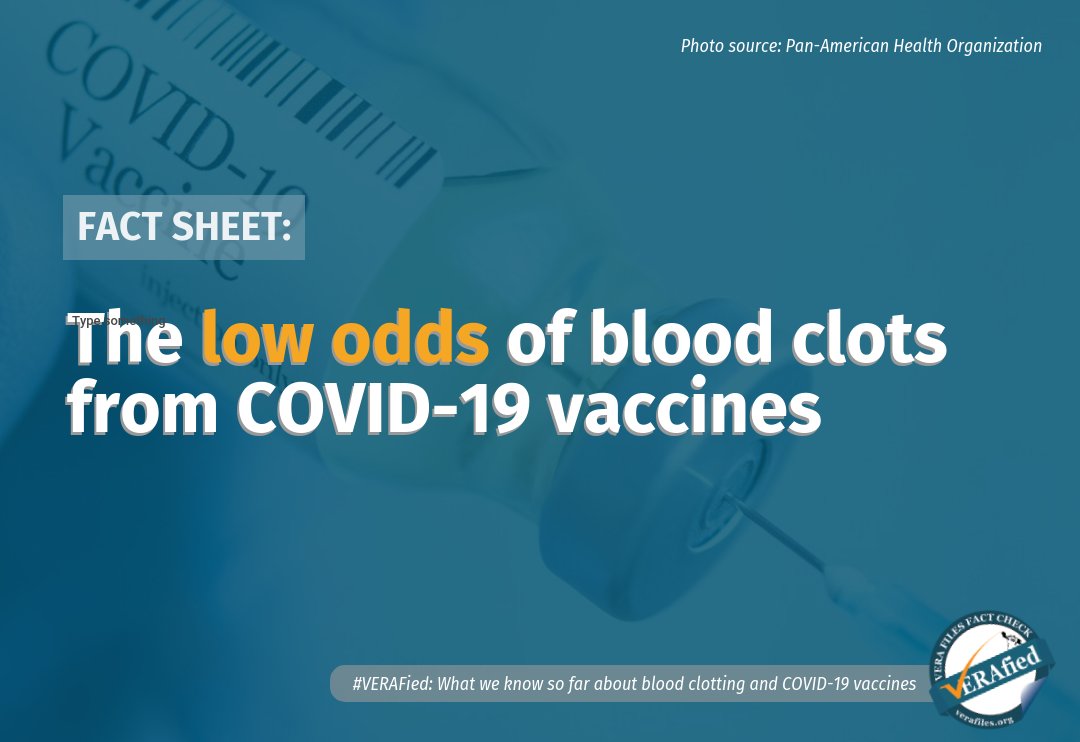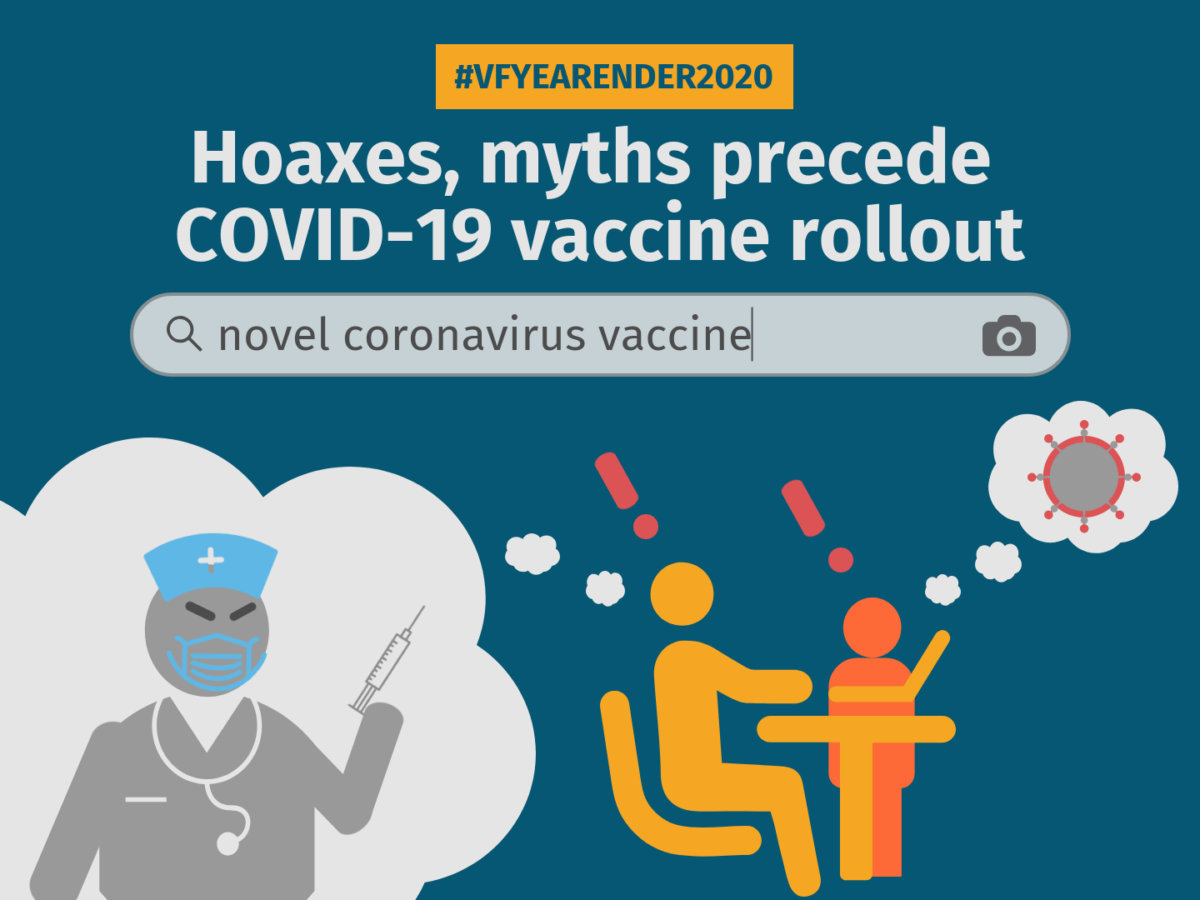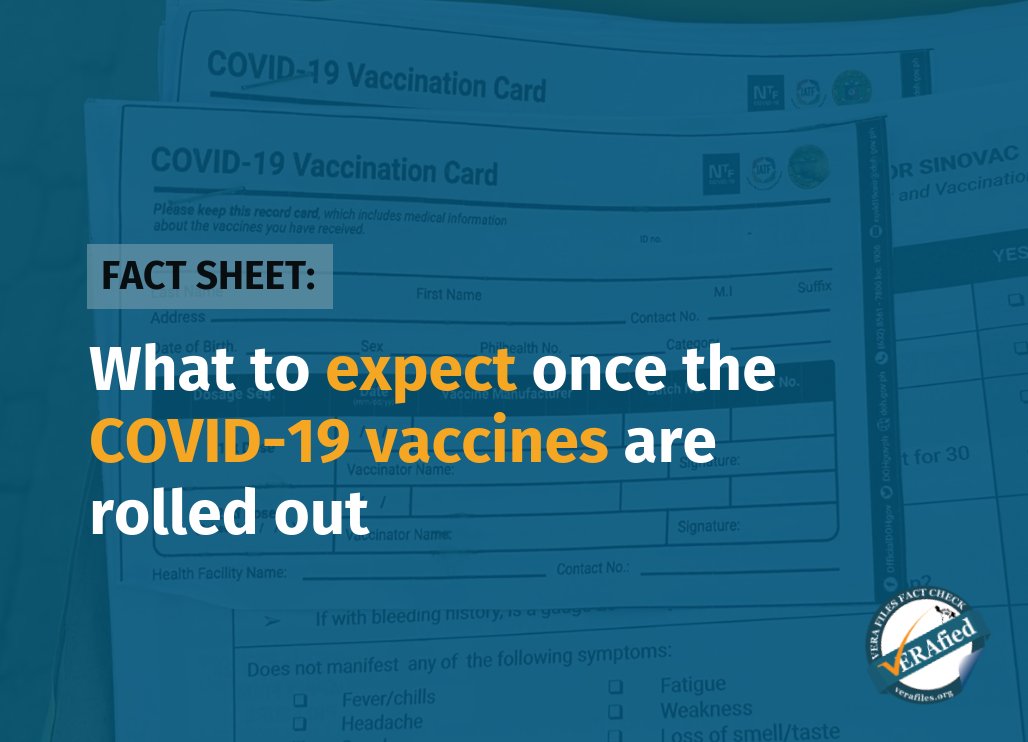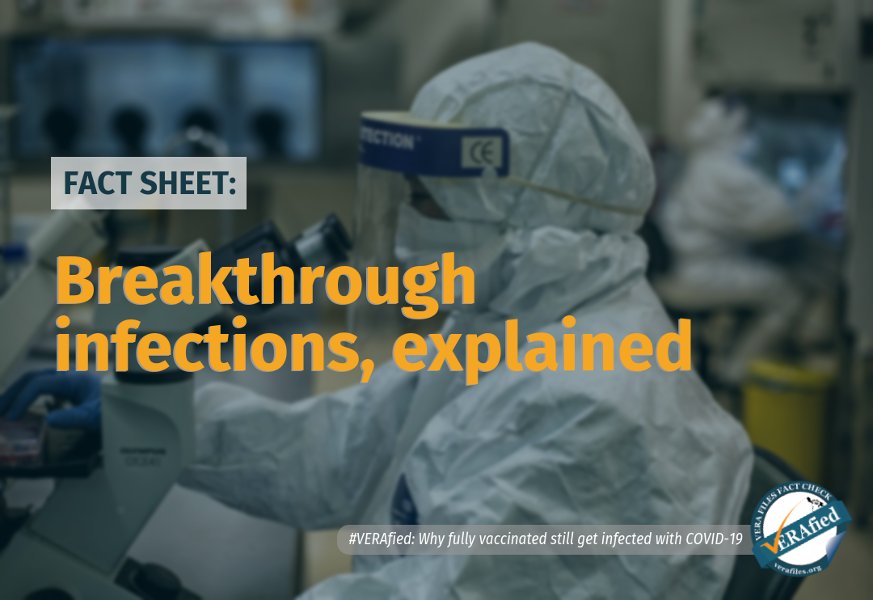Health experts underscored the need to “increase the pace of vaccination” as the Philippines’ coronavirus disease 2019 (COVID-19) infections breached the one million mark on April 26.
“The number 350,000 [shots per day] is [what] we need to be able to vaccinate 70% of our population … This is a target that we should try to strive for,” said John Wong, epidemiologist and member of the national COVID-19 task force on data analytics, in a press briefing the same day the government announced that cases had exceeded one million.
As of April 27, only about 35,300 Filipinos are getting vaccinated daily with doses from Sinovac and AstraZeneca, based on a seven-day average report by the Department of Health (DOH). Less than 1% (or 246,986) of the target 70 million people have completed the two doses. (See VERA FILES FACT SHEET: What it takes to be ‘ready’ to roll out the COVID-19 vaccines)
The Food and Drug Administration (FDA) has resumed the use of AstraZeneca’s COVID-19 jab for people below 60 years old after a temporary suspension following reports of rare blood clotting reactions abroad, noting that the vaccine’s “benefits outweigh the risks.”
Here are four things you need to know about this uncommon blood disorder:
1. What do we know so far about blood clotting and COVID-19 vaccines?
In separate reports earlier this month, the European Medicines Agency (EMA) said unusual blood clots with low platelet counts should be listed as “very rare” side effects of two COVID-19 vaccines: that of Oxford-AstraZeneca and Janssen Pharmaceuticals.
The European health authority found a possible link between the vaccines and the blood condition — medically called thrombosis with thrombocytopenia syndrome (TTS) — after looking into reported cases, which happened within two (AstraZeneca) to three (Janssen) weeks after a few recipients got their jabs.
Thrombosis is the abnormal formation of clots. Thrombocytopenia ー from the words thrombus (clot), cyto (cell), and penia (lowered count) ー is a condition of low blood platelet count that could lead to excessive bleeding or bruising.
“The issue here is the paradoxical occurrence of clotting when your platelets are low because you expect bleeding, not clotting, to be occurring … It’s really rare to have thrombosis in the presence of thrombocytopenia,” Rosalio Torres, blood expert and founding president of the Philippine College of Hematology and Transfusion Medicine (PCHTM), told VERA Files Fact Check in an interview.
A feature that makes TTS unusual is that the blood clumps were found in either the brain or abdomen. These sites “are rarely involved in the usual cases of thrombosis,” said Torres, who is also the chief of the hematology section at the Makati Medical Center.
“We usually form clots in the legs … these would travel and get lodged in some areas and end up in the lungs (pulmonary embolism),” he added.
Most of the reported TTS cases following the two vaccines happened in women under 60 years old. But EMA stressed that “the overall benefits of the vaccine in preventing COVID-19 outweigh the risk of side effects.”
A number of countries that had earlier paused the use of AstraZeneca jabs to assess the impact of the condition on their populations — such as France, Germany, and Italy — have resumed the administration of the vaccine after the EMA report.
In an April 16 statement, the World Health Organization (WHO) said whether the mechanism is specific to the vaccine platforms (both vaccines are viral vector vaccines) is “not certain but cannot be excluded.”
Meanwhile, Russian vaccine maker Gamaleya has said in a statement that “there were no cases of cerebral venous sinus thrombosis (blood clots that occurred in the veins in the brain)” reported over the course of mass vaccinations using its COVID-19 jab (Sputnik V), which uses the same platform.
One plausible explanation for the appearance of blood clots and low blood platelets is “an immune response, leading to a condition similar to one seen sometimes in patients treated with heparin (a blood thinner),” the EMA report read.
Torres said heparin-induced thrombocytopenia “has been studied very well” and is currently the basis of many scientists in investigating TTS cases following immunization.
He also emphasized that the reported immune thrombocytopenia purpura (ITP) cases after getting Pfizer-BioNTech and Moderna shots in early February are a different hematologic complication since they do not have thrombosis. The link has also not been confirmed. (See VERA FILES FACT CHECK: Filipina abroad develops blood disorder after getting Moderna jab, but link is UNCERTAIN)
At present, there is no standard case definition “accepted for use by all countries” for the rare condition, according to WHO. Some experts have also referred to it as vaccine-induced thrombotic thrombocytopenia or vaccine-induced prothrombotic immune thrombocytopenia.
2. What are the chances of developing TTS after getting a COVID-19 vaccine?
The odds of this serious adverse reaction are “extremely low” based on available data.
In the United Kingdom, the risk after receiving the AstraZeneca’s vaccine Vaxzevria is estimated to be at four cases per million (or one per 250,000), and one per 100,000 adults in the European Union, according to an April 16 statement from WHO.
Meanwhile, the United States (U.S.) Centers for Disease Control and Prevention reported only 15 confirmed cases of TTS out of 7.98 million Janssen doses administered as of April 21.
The specific risk factors that could predispose a person to the condition have also not been confirmed given the available evidence.
3. Have there been reports of local cases of blood clots after vaccination?
No. After an 11-day pause on the use of AstraZeneca for Filipinos below the age of 60, the Philippine FDA said it has yet to record a case of this rare blood clotting reaction following inoculation as of April 23.
FDA Director-General Eric Domingo said in a statement on April 8 that the halt “does not mean that the vaccine is unsafe or ineffective,” rather, the agency is “taking precautionary measures to ensure the safety of every Filipino.”
The FDA recently issued an emergency use authorization for Janssen’s one-dose vaccine, which is slated to arrive in the second half of 2021. Meanwhile, the delivery of Russia’s Sputnik viral vector vaccine is expected in early May.
Health Undersecretary Maria Rosario Vergeire has said in a media forum: “We need to train our health worker[s] so they can immediately recognize this kind of adverse events among our citizens who will be vaccinated so we can be on the safe side.” (See VERA FILES FACT SHEET: What it takes to be ‘ready’ to roll out the COVID-19 vaccines)
Vergeire also said in an April 23 press briefing that “most adverse events from vaccines are mild and of limited duration,” as has been shown in cases observed in the country.
4. Is this a reason not to get vaccinated?
Torres said people should “look first at the risk of getting COVID which is very very high, as against the risk of getting an adverse effect from a vaccine so as not to get COVID, which is extremely low.”
“The benefits would far outweigh this very, very small risk,” he added.
Citing scientists from the University of Oxford, a team of public health experts from the global nonprofit Meedan said those who are infected with the disease are, in fact, “100 times more likely to develop blood clotting than people who are not.”
The risk of blood clotting after a COVID-19 infection was “eight times higher than that of blood clotting after receiving the AstraZeneca COVID-19 vaccine,” it added.
DOH also said patients who receive COVID-19 jabs will still undergo monitoring and surveillance at the vaccination site. (See VERA FILES FACT SHEET: What to expect once the COVID-19 vaccines are rolled out)
Torres told VERA Files Fact Check that the PCHTM, along with the Philippine College of Physicians, have already submitted guidelines to the DOH on how to proceed if and when these reactions arise.
To avoid COVID-19 vaccine misinformation, know which five red flags to watch out for in this story.
Sources
Philippine resumes AstraZeneca COVID-19 vaccine
- Rappler, Philippines resumes use of AstraZeneca vaccine for people below 60, April 19, 2021
- CNN Philippines, PH to resume use of AstraZeneca vaccines for people below 60, April 19, 2021
- Inquirer.net, DOH heeds FDA’s advice to continue AstraZeneca vaccination, April 17, 2021
Department of Health, DOH, FDA TEMPORARILY SUSPEND ASTRAZENECA VACCINATION FOR PERSONS BELOW 60, ASSURE SAFETY AND VALIDITY OF VACCINES | Department of Health website, April 8, 2021
European Medicines Agency, AstraZeneca’s COVID-19 vaccine: EMA finds possible link to very rare cases of unusual blood clots with low blood platelets | European Medicines Agency, April 8, 2021
European Medicines Agency, COVID-19 Vaccine Janssen: EMA finds possible link to very rare cases of unusual blood clots with low blood platelets | European Medicines Agency, April 20, 2021
On thrombosis with thrombocytopenia syndrome
- World Health Organization, Global Advisory Committee on Vaccine Safety (GACVS) review of latest evidence of rare adverse blood coagulation events with AstraZeneca COVID-19 Vaccine (Vaxzevria and Covishield), April 16, 2021
- Meedan Digital Health Lab, What do we know about the AstraZeneca vaccine and blood clotting?, April 21, 2021
- Brighton Collaboration, Interim Case Definition of Thrombosis with Thrombocytopenia Syndrome (TTS), April 21, 2021
- The New England Journal of Medicine, Thrombosis and Thrombocytopenia after ChAdOx1 nCoV-19 Vaccination | NEJM, April 9, 2021
- Meedan Digital Health Lab, What is vaccine-induced thrombosis and thrombocytopenia (VITT)?, April 16, 2021
- U.S. CDC, CDC Presentation, April 23, 2021
- U.S. Natinonal Institutes of Health National Heart, Lung, Blood Institute, Thrombocytopenia | NHLBI, NIH
- Johns Hopkins Medicine, Thrombosis
On the use of AstraZeneca’s COVID-19 vaccines
- Al Jazeera, Which countries have stopped using AstraZeneca’s COVID vaccine?
- Meedan Digital Health Lab, European countries pausing the Oxford-AstraZeneca vaccine over fears of blood clotting
- DW Akademie, AstraZeneca: Germany, other European countries to resume use of vaccine, March 18, 2021
- BBC News, Covid-19: EU states to resume AstraZeneca vaccine rollout, March 18, 2021
- Reuters, Germany, France among nations to resume use of AstraZeneca vaccine after regulators back shot, March 19, 2021
On the use of Johnson & Johnson’s COVID-19 vaccine
- The Washington Post, European regulator says J&J; coronavirus vaccine needs rare blood clot warning but that benefits outweigh risks, April 20, 2021
- The New York Times, Covid-19: Johnson & Johnson to Resume Its Vaccine Rollout in Europe, April 25, 2021
- BBC News, Johnson & Johnson vaccine: EU regulator says blood clot very rare side effect, April 21, 2021
Department of Health, Beat COVID-19 Media Forum, April 23, 2021
Food and Drug Administration, Reports of Suspected Adverse Reaction to COVID-19, April 11, 2021
Presidential Communications Operations Office Global Media Affairs, Status of Philippine COVID-19 Vaccine Procurement
Gamaleya Research Institute, The Gamaleya Center statement | Official website vaccine against COVID-19 Sputnik V.
Food and Drug Administration, ChAdOx1-S[recombinant] (COVID-19 Vaccine AstraZeneca) – Food and Drug Administration
Food and Drug Administration, Janssen COVID-19 Vaccine – EUA Fact Sheet for Recipients and Caregivers
Meedan Digital Health Lab, What kind of impact can COVID-19 have on blood and circulation?, July 3, 2020
(Guided by the code of principles of the International Fact-Checking Network at Poynter, VERA Files tracks the false claims, flip-flops, misleading statements of public officials and figures, and debunks them with factual evidence. Find out more about this initiative and our methodology.)





